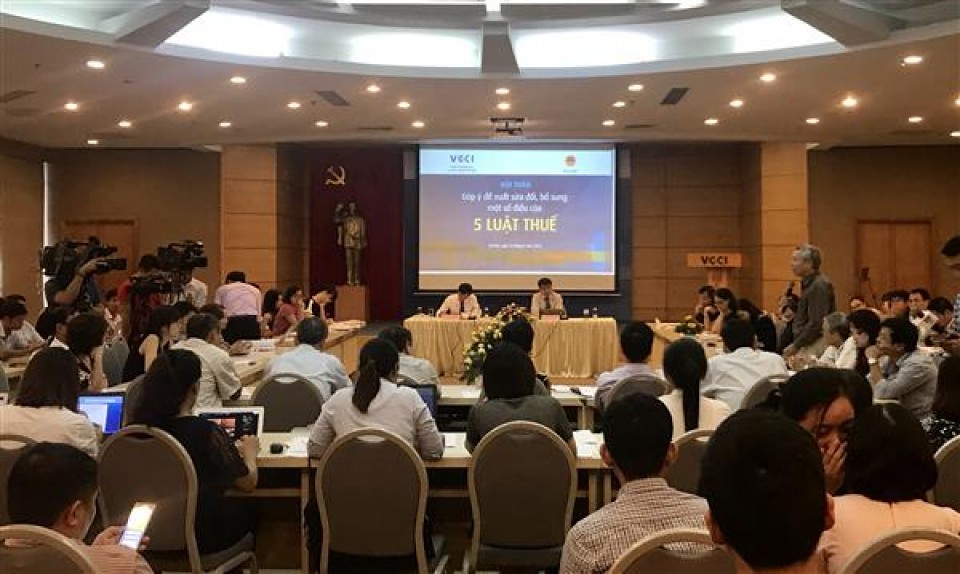The Ministry of Finance will accept opinions to amend 5 tax laws
VCN- Accordingly, the Ministry of Finance will fully absorb the opinions of associations, enterprises, and citizens on the Law on Amendments and Supplements to a Number of Articles of the 5 Tax Laws. The Ministry of Finance will also coordinate with relevant agencies to study, create synchronism, meet the requirements set out.

This is the affirmation of Mr. Truong Ba Tuan, Deputy Director of Financial Strategy and Policy Institute, Ministry of Finance at the seminar to propose amendments and supplements to a number of articles of the 5 Tax Laws issued by the Vietnam Chamber of Commerce and Industry (VCCI) in collaboration with the Ministry of Finance held on 14 September in Hanoi.
Transparent revenue – expenditure
The seminar has received the attention of many business communities, associations and economists. Cause of the amendment of 5 tax laws is assessed will have a great impact on many areas, many objects from people to businesses.
According to Mr. Truong Ba Tuan, the world and regional economic situation continue to evolve complexly, together with the process of international integration poses many difficulties and risks. The tax policy system issued last time has basically achieved the goal. However, this system needs to study the amendment and supplementation so far in order to restructure state budget revenues. To implement the objectives of reform, to build a uniform tax system in line with international practice; ensuring the unification of the legal system and removing difficulties for enterprises etc.
For the reasons mentioned above, the experts and enterprises at the conference agreed with the proposal to amend 5 tax laws of the Ministry of Finance.
However, according to economist Pham Chi Lan, when proposing, the Ministry of Finance and related agencies should explain and assess the impact of increasing or decreasing taxes, to ensure if the increase of budget revenue is sustainable or not.
“Tax policies must be in line with the fields and policies of development of economic sectors and fields. Under the economic restructuring program, the spirit of encouraging the industry, developing the other sector is reflected in taxes as this is an important tool. Otherwise, it would be impossible to develop a branch but increase tax is not possible,” Ms. Pham Chi Lan emphasized.
By the same token, according to lawyer Truong Thanh Duc, Chairman of the Basico Law Firm Council, VAT is an indirect tax on consumers, especially end users, but still, affects costs. Reduce direct profits to businesses in particular and general business. Therefore, the drafting agencies need to solve the problem properly, collect sufficient and fair to combat losses.
“Different rates should not be imposed, but a single 10% rate should be applied to ensure simplicity, fairness, and convenience in application, especially for operating enterprises. Multidisciplinary, interwoven together also avoid the abuse of tax evasion, tax dodge,” lawyer Duc suggested.
Also discussing the VAT, according to Ms. Dang Thi Binh An, senior tax, and customs expert, C&A Tax Consulting Company, now the VAT rate of Vietnam compared to some countries may be low but the structure of VAT in the total budget revenue of some countries is high.
Therefore, Ms. An asked the Ministry of Finance to study and submit to the Government and the National Assembly the promulgation of new tax laws aimed at regulating the sources of income from other sources of income that are suitable to the market economy in order to increase budget revenues and reasonably change the revenue structure.
In addition, the expert suggested that the Ministry of Finance should reconsider non-VAT objects in the following direction: Select a number of very special goods with specific names to be subject to non-VAT; Or clarify the criteria for distinguishing objects subject to VAT/VAT-exempt objects or goods subject to a VAT rate of 5% and commodities subject to a tax rate of 10% for easy mistaken objects like fisheries, breeding, resources etc.
Need unity
In addition, at the seminar, enterprises, and associations also suggested the drafting unit is the Ministry of Finance should coordinate with the relevant units such as Ministry of Health, Ministry of Industry and Trade etc., to provide the most appropriate policy, avoid the wrong tax with some items.
However, according to experts, in addition to the amendment of the five tax laws, the Ministry of Finance should find ways to unify the tax laws because many other taxes have not been revised this time.
“Together with the five laws, five other tax laws (Law on Export Tax, Import Tax, Law on Environmental Protection Tax, Law on Non-agricultural Land Use Tax, Law on Agricultural Land Use Tax and Law on Tax Administration) are also necessary to study the drafting of a common tax code,” lawyer Truong Thanh Duc proposed.
With this idea, economist Pham Chi Lan said that law-drafting agencies should look at the impact in all aspects, cannot separate because people and businesses still bear many costs and procedures administrative.
After listening to all opinions of enterprises, representatives and experts at the seminar, Mr. Truong Ba Tuan affirmed that the Ministry of Finance will accept all of direct comments and comments added to complete the draft to submit to the Government. Mr. Tuan also said that the bill has a great impact, the Ministry of Finance must evaluate, coordinate with other ministries and sectors to study, unify, help complete the law in the best way, meet the actual needs of people and businesses.
Source: customsnews.vn
